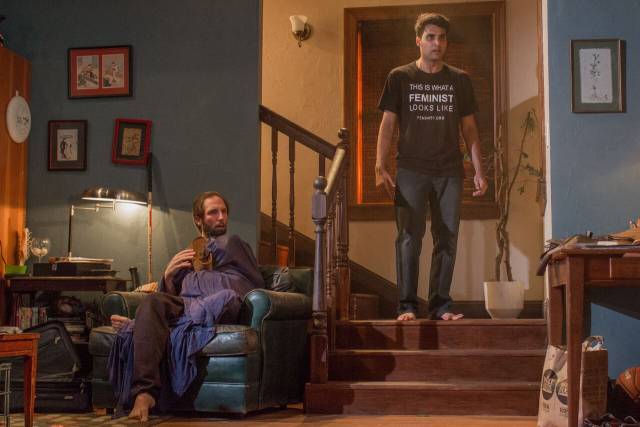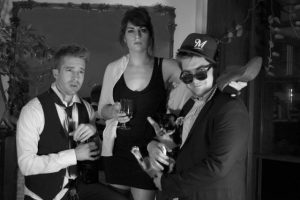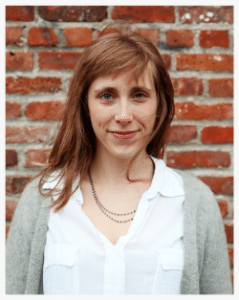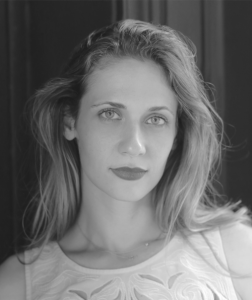

Recently, I saw Caroline V. McGraw’s The Bachelors at the Rattlestick Playwrights Theater, produced by guest company Lesser America. While I thoroughly enjoyed the play, it is certainly a complicated affair: the script utilizes the language of modern misogyny to ask some fairly dark questions about the treatment of women, but on the outside it remains a comedy about three 30-something "bros." After the show, I sat down with the creative team to discuss the challenges of the play, the feminism of the script, and the delicate balance of comedy and trauma.
Lesser America has been producing theater in New York for nearly five years now, and earlier this year I reviewed their show Wyoming. Two times now, I have been struck by the their ability to craft a complex, dangerous, and fundamentally human story. After speaking with director Portia Krieger and the Lesser America team, Claire Siebers (Producing Director) and Daniel Abeles and Laura Ramadei (founding members with Nate Miller), the company seems more focused, grounded, and intelligent than ever.

I don't know if you saw this, but there was an article about the dual reaction to Unbreakable Kimmy Schmidt when it came out, where half the audience thought, "This is so funny!" and half were like, "This is about trauma." I saw that kind of experience in the audience tonight. How did you navigate the comedy of the show versus the half that's like, "There’s a girl in danger upstairs."
Laura Ramadei: I think we’re still navigating that. Even in the rehearsal room, before we put butts in seats, we anticipated that there would be different laughs at different times and stuff that escapes certain audiences, and other things that certain audiences would latch onto. We get as many uncomfortable laughs as we do uproarious, like, “This is supposed to be funny, we’re being told to laugh at this moment” responses, and then people who will enjoy the shit out of the show and leave wondering why they feel queasy or gross about it. What I think is brilliant about what Caroline has written is that you start off thinking it’s one kind of play, and it very slowly unravels and sort of sneaks up on you, and if you’re intelligent you realize by the end that you’re watching something very different than what your entry point was.
Portia Krieger: There’s a kind of – my hope is that the audience will find themselves complicit in the play’s shady dealings. It’s a lot to ask our brave gentlemen to navigate, and audiences have been sort of wildly different from night to night. I think that’s the thing that’s happening in the play: there is a person who is potentially in danger in the attic, and many many minutes go by in which no one ever quite succeeds at making it up there, and that behavior is very true to me. The experience of watching the play is kind of a mirror of that, in some ways, if we’re doing what we’re doing successfully.
There’s definitely a trope in theatre where there’s a small mostly-male cast, where you look back on those plays now and the men are just awful (like Hurlyburly). I feel like this play really overcame that be profoundly feminist. I still feel like I got hit in the head a little bit... Can you speak to that?
Laura: Yeah, I think it takes a convention that we know and uses it for a different objective. Caroline’s a feminist, and a very bright feminist writer, but instead of writing a morality play about three women dealing with misogyny, she wrote a play about three dudes we all know, in a context we’re familiar with. And it’s interesting even to do it here [at Rattlestick], because a lot of plays by writers like that – like the Hurlyburlys and the Adam Rapps and the plays about muscular men — have existed in this space. We’re sort of doing that (it’s a play about three bros), but it’s got a feminist spin on things which is exciting to me.
Portia: And I think ultimately, Caroline would say that the men in the play are harmed by their own misogyny, just as anyone else is, that it cripples their relationship with each other and it cripples their ability to exist in the world as autonomous adults and to like feel love and accept love. So in that way, the play is both very much about women and also – I think what’s most successful about it – is that Caroline does really seem to have found a way to not judge – to observe this behavior and put it on stage and let it play out without judging it. Or while remaining – keeping her empathy for what the characters are going through. So, even when [Babak Tafti's character] is saying preposterous things about this stripper that he thinks he’s in love with, we’re still able to go down the road of that with him.

[To Dan] Can I ask – and this will not be a “gotcha question” – but as the man in the room who is also a founding member of Lesser America, what did you see in the script when you first read it?
Daniel Abeles: At first glance, it has all the basic elements of a play that you would want to see. You can see the pictures, see the relationships, see the humor, see the underlying danger in it. After being satisfied with all those basic elements, the overarching reach of the play is pretty grand. So I thought it had a lot of things to ask and I was impressed by it not attempting to answer all the things that it was trying to ask. No one wants to see an 80-minute play that’s incredibly dogmatic. They want to see an 80-minute play that makes them laugh, opens them up, and forces them to ask questions. And yeah, some of [Caroline's] turns of phrase are great. She has some beautiful prose.
Yeah, I actually think for auditions I might try to find this script and use a few monologues. They’re pretty great.
Laura: (Laughter.) You could use both characters to show contrast.
Plus I should be able to play a straight misogynist, that should be –
Laura: That should be in your roster.
Claire Siebers: I think that speaks to a very strong aspect of our selection process, which is that we’re all actors. So when we are looking for plays, we’re looking for plays that we would want to be in – that people would want to be in – and that people would want to come see. That’s very basic but those two questions are always in my mind because I see a lot of plays where I think, “I don’t really want to be here! Apart from the fact that I’m here experiencing this art form in this community I’m apart of, but I would not want to be there doing it.” Then of course I have the opposite reaction, as well, and those are the plays I usually leave thinking about the play, and take with me. I want the plays that we put out to have a life beyond the viewership. I want people to think about them for a long time afterwards.
Dan: This is a play where you see the actors on stage having a lot of fun doing, where you can watch three people just sort of right in the groove. They’re having a great time doing it, and I think they know what purpose they’re serving. So as you were saying before, it’s like a tricky line. You are aware of the questions you are raising, and these are pretty archetypal characters, but even still they each have their own groove and rhythm. And when they're in it, it’s fucking great to watch.
You all started as actors, but at this point play a lot of different roles: producing, artistic directing, etc. What's been challenging about that transition?
Claire: I feel like the move from acting to producing is one of necessity. When you’re an actor you get hired — you don’t do a lot of hiring — so it’s really hard to have agency over the kind of work you want to do, or how you want to contribute to theater. Then you meet people that you want to work with, and when you produce theater you get to hire people permanently. It’s just exciting to have agency and collaboration, which you do have when you’re acting but it’s, like, wonderful to be a producer and get a bunch of people in a room that you really admire and support them in whatever they’re doing.
It's been five years now for the company. How has the mission statement changed or how has your relationship to it changed?
Laura: We’ve actually… I won’t say that we’ve rewritten it much because we actually kind of crafted something that I still stand by, even five years ago, which was: accessibility, affordability, entertainment value. Like, we don’t want to charge a lot of money for our tickets. Which we haven’t hiked our ticket price at all since we started producing.

That’s awesome, and rare.
Dan: I succeeded in changing the word “fledgling.” I was just like, “We’re past two years. We’re not fledgling anymore."
Laura: Yeah, it was like instead of saying fledgling, we just say, “Theatre company!” But affordability and accessibility is important to us. We definitely still don’t do chaotic theater that people leave without any sense of what they just watched. We like to create stuff that people would enjoy as much as they watch movies or any mainstream form of entertainment. I will say that our mission has strengthened. We kind of put it out there limply at the beginning knowing we needed one, thinking like, “This is kind of what we want to do, right?”
And that’s step one to doing a theater company and so you did it.
Laura: Yeah, and we “had a mission statement,” but now I stand so firmly behind it and I’m furious that like other theaters charge literally ten times more than we do for the same amount of time to sit in a seat and I’m really committed to creating theater that people care about that aren’t already in the community. So yeah, it’s the same mission statement, I just think we’re more deeply attached to it than we were in the beginning. Before we knew what it felt like to make a ripple in this industry.
Anything you want to plug?
Laura: We do have a residency at Cherry Lane, which I think we’re allowed to talk about. It’s being announced in their brochures. There’s going to be a party and an announcement, I think the week of Thanksgiving. We’re going to do a show at Cherry Lane next year and do a residency for two years open ended.
Dan: A non-exclusive residency! That does not preclude us from doing work elsewhere!
Performances of The Bachelors continue through November 29. For more information and tickets visit: https://www.lesseramerica.com/